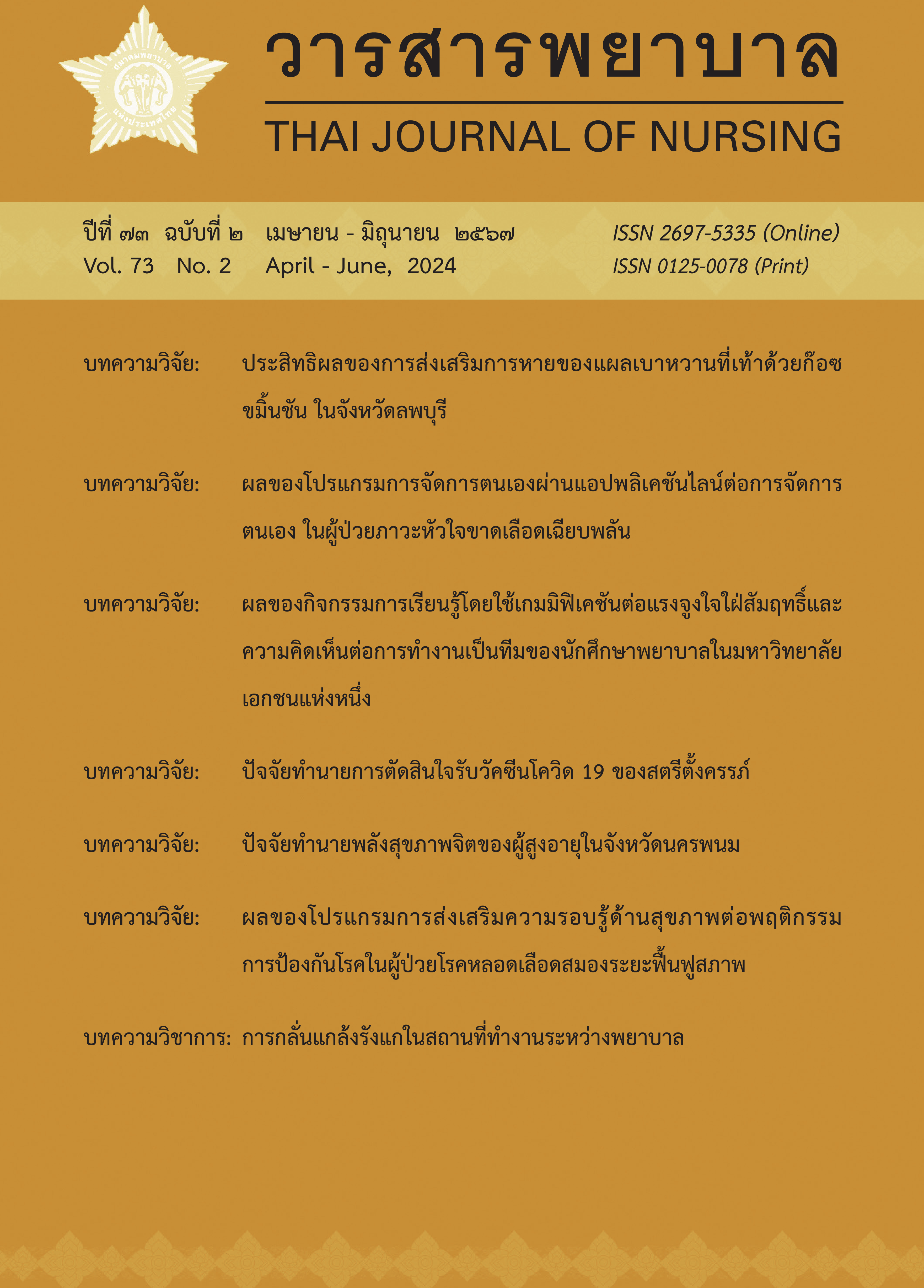The effect of health literacy enhancement program on stroke preventive behaviors among stroke patients on recovery stage
Main Article Content
Abstract
This quasi-experimental research is pretest- posttest control group design.The aim of this research was to determine effect of a health literacy enhancement program on stroke preventive behaviors among stroke patients on recovery stage. A sample of 60 stroke patients on recovery stage, was purposively selected and equally divided into the control group and experimental group, 30 patients in the experimental group received a health literacy enhancement program and 30 patients in the control group received routine nursing care. Research instruments included stroke preventive behavior questionnaire and health literacy questionnaire, The content validity index of 2 questionnaires are 0.93 and 0.87 respectively, reliability coefficients are 0.71 and 0.86 respectively. Data were analyzed using descriptive statistics and t-test. The results of implementation of a health literacy enhancement program caused higher stroke preventive behavior in stroke patients on recovery stage. As the results that after experiment, stroke preventive behavior of patients in the experimental group (x̄ = 64.90, SD = 5.95) were significantly higher than before experiment (x̄ = 60.20, SD = 5.65) at a statistical significance .05 (t = - 5.95, p < .001) and higher than those in the control group ( x̄ = 58.70, SD = 5.65 ) at a statistical significance .05 (t = -3.314, p < .001)
Article Details

This work is licensed under a Creative Commons Attribution-NonCommercial-NoDerivatives 4.0 International License.
References
กระทรวงสาธารณสุข กรมสนับสนุนบริการสุขภาพ. (2564). แบบประเมินความรอบรู้ด้านสุขภาพ. http://www.hed.go.th/ linkHed
จิราวรรณ วิริยะกิจไพบูลย์ และ ชนกพร จิตปัญญา. (2559). ความสัมพันธ์ระหว่างความรู้ การรับรู้ประโยชน์ ภาวะซึมเศร้า การสนับสนุนทางสังคม และการป้องกันการกลับเป็นซ้ำของโรคในผู้ที่รอดชีวิตจากโรคหลอดเลือดสมอง. วารสารพยาบาลตำรวจ, 8(2), 34-44.
จุฑาทิพย์ เทพสุวรรณ, วีนัส ลีฬหกุล, และทิพา ต่อสกุลแก้ว. (2562). The effects of recurrent prevention program for stroke patients at a tertiary level hospital in Nakhon Pathom Province. วารสารสมาคมโรคหลอดเลือดสมองไทย, 17(1), 5-18.
ทิวาพร วิถี, วีณา เที่ยงธรรม, และเพลินพิศ บุณยมาลิก. (2564). โปรแกรมส่งเสริมพฤติกรรมป้องกันการกลับเป็นซ้ำของผู้ป่วยโรคหลอดเลือดสมอง. วารสารเกื้อการุณย์, 28(1), 7-19.
ปรารถนา วัชรานุรักษ์ และ อัจฉรา กลับกลาย. (2560). ปัจจัยที่มีอิทธิพลต่อพฤติกรรมการป้องกันโรคในผู้ป่วยกลุ่มเสี่ยงโรคหลอดเลือดสมอง จังหวัดสงขลา. วารสารเครือข่ายวิทยาลัยพยาบาลและการสาธารณสุขภาคใต้, 4(1), 217-233.
ปรีดา อารยาวิชานนท์. (2559). การฟื้นฟูผู้ป่วยโรคหลอดเลือดสมอง. สรรพสิทธิเวชสาร, 37(1-3), 43-58.
ผู้จัดการออนไลน์. (2565, 26 พฤษภาคม). ข่าวปลอม! เช็กว่าเป็นโรคหลอดเลือดตีบที่สมองด้วยตนเอง เพียงแค่ยืนและก้มศีรษะ. Manager Online, 1. https://mgronline.com/factcheck/detail/9650000050184
ยุทธนา ชนะพันธ์ และ ดาริวรรณ เศรษฐีธรรม. (2561). ปัจจัยที่มีความสัมพันธ์กับพฤติกรรมป้องกันโรคหลอดเลือดสมองในผู้ป่วยโรคความดันโลหิตสูง อำเภอกุมภวาปี จังหวัดอุดรธานี. วารสารโรงพยาบาลสกลนคร, 21(2), 109-119.
วชิราวุฒิ หวังสม, อังศินันท์ อินทรกำแหง, และฉัตรชัย เอกปัญญาสกุล. (2561). ลักษณะทางสังคมและคุณ ลักษณะความฉลาดกับการทำนายพฤติกรรมการดูแลสุขภาพของผู้ป่วยเสี่ยงต่อโรคหลอดเลือดสมองตีบ. วารสารการแพทย์และวิทยาศาสตร์สุขภาพ, 25(2), 82-96.
สมศักดิ์ เทียมเก่า. (2565). แนวโน้มการเสียชีวิตผู้ป่วยโรคหลอดเลือดสมองเฉียบพลัน. วารสารประสาทวิท ยาแห่งประเทศไทย, 39(2), 32-38.
สำนักงานปลัดกระทรวงสาธารณสุข กองยุทธศาสตร์และแผนงาน. (2566). สถิติสาธารณสุข พ.ศ. 2565. https://spd.moph.go.th/wp-content/uploads/2023/11/Hstatistic65.pdf
สำนักงานป้องกันควบคุมโรคที่ 10 จังหวัดอุบลราชธานี. (2561). การดำเนินงานพัฒนาการป้องกันควบคุมโรคร่วมกับจังหวัด ปีงบประมาณ 2560. https://odpc10.ddc.moph.go.th/wp-content/uploads/2018/01
สุจิตรา คุ้มสะอาด, วีณา เที่ยงธรรม, และเพลินพิศ สุวรรณอำไพ,. (2561). ปัจจัยด้านพฤติกรรมที่มีความสัมพันธ์การกลับเป็นซ้ำของผู้ป่วยโรคหลอดเลือดสมอง. วารสารพยาบาลสาธารณสุข, 31, 13-26.
สุวิดา ลิ่มเริ่มสกุล, จงจิต เสน่หา, ดวงรัตน์ วัฒนกิจไกรเลิศ, และปฏิณัฐ บูรณะทรัพย์ขจร. (2565). ผลของโปรแกรมพัฒนาความรอบรู้ด้านสุขภาพต่อพฤติกรรมการดูแลตนเองของผู้สูงอายุเบาหวานชนิดที่ 2 วารสารพยาบาลศาสตร์, 40(1), 84-98.
อรอุมา คงแก้ว. (2561). การรับรู้การเจ็บป่วย และพฤติกรรมการป้องกันการกลับเป็นซ้ำในผู้สูงอายุโรคหลอดเลือดสมอง [วิทยานิพนธ์ปริญญามหาบัณฑิต, มหาวิทยาลัยสงขลานครินทร์]. PSU Knowledge Bank.
https://kb.psu.ac.th/psukb/handle/2016/12981
อารีย์รัตน์ เปสูงเนิน, นันทวัน สุวรรณรูป, และวันเพ็ญ ภิญโญภาสกุล,. (2561). ปัจจัยทำนายพฤติกรรมการป้องกันโรคของผู้ป่วยกลุ่มเสี่่ยงที่มารับบริการในปฐมภูมิ. วารสารสุขภาพวิทยาลัยพยาบาลบรมราชชนนี นครราชสีมา, 24(1), 40-56.
Aaby, A., Friis, K., Christensen, B., Rowlands, G., & Maindal, H. T. (2017). Health literacy is associated with health behaviour and self-reported health: A large population-based study in individuals with cardiovascular disease. European Journal of Preventive Cardiology, 24(17), 1880-1888.
Kuriakose, D., & Xiao, Z. (2020). Pathophysiology and treatment of stroke: Present status and future perspectives. International Journal of Molecular Sciences, 21(20), 1-24.
Lennon, O., Blake, C., Booth, J., Pollock, A., & Lawrence, M. (2018). Interventions for behaviour change and self-management in stroke secondary prevention: Protocol for an overview of reviews. Systematic Reviews, 7(1), 1-9. https://doi.org/10.1186/s13643-018-0888-1
Polit, D. F., & Beck, C. K. (2004). Nursing research: Principle and methods. Lippincott Williams & Wilkins.
Solomon, J. M., Mahmood, A., English, C., & Natarajan, M. (2021). Physical exercise literacy, beliefs, and preferences among stroke survivors living in a developing country. Annals of Physical and Rehabilitation Medicine, 64(6). 101473. https://doi.org/10.1016/j.rehab.2020.101473
Sorensen, K., Van den Broucke, S., Fullam, J., Doyle, G., Pelikan, J., Slonska, Z., Brand, H., & (HLS-EU) Consortium Health Literacy Project European. (2012). Health literacy and public health: A systematic review and integration of definitions and models. BMC Public Health, 12(80), 1-13.


